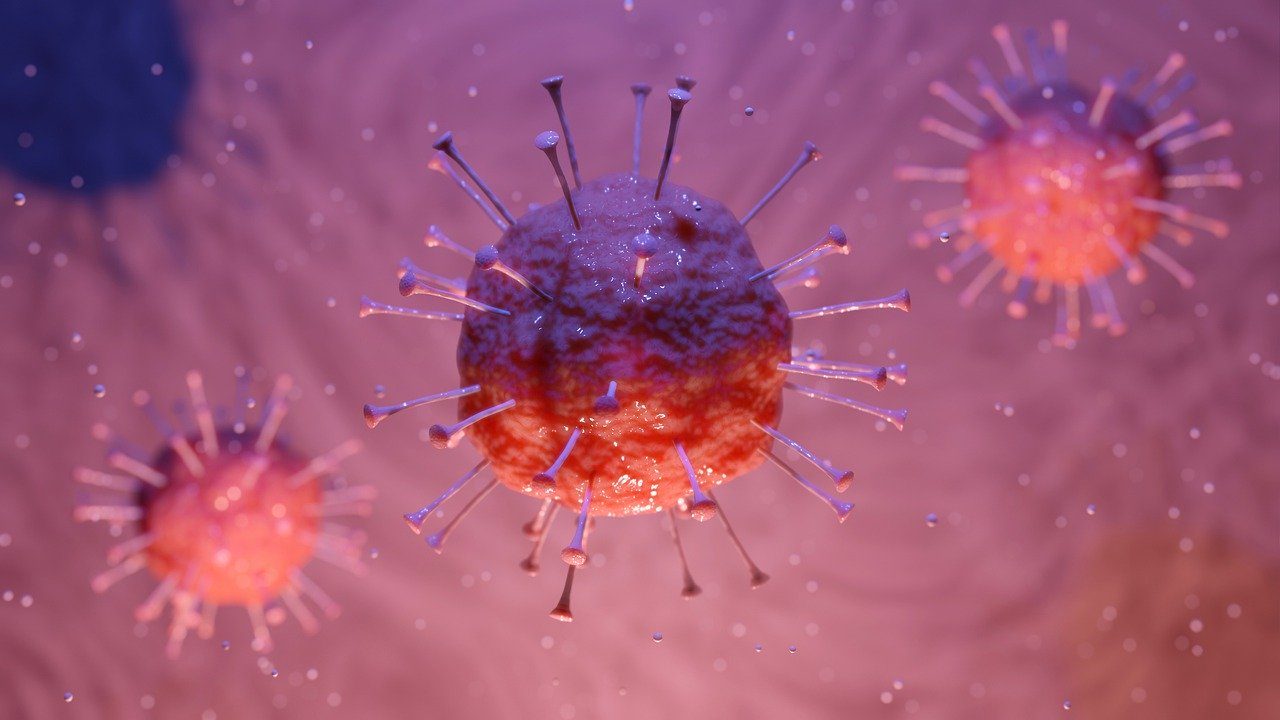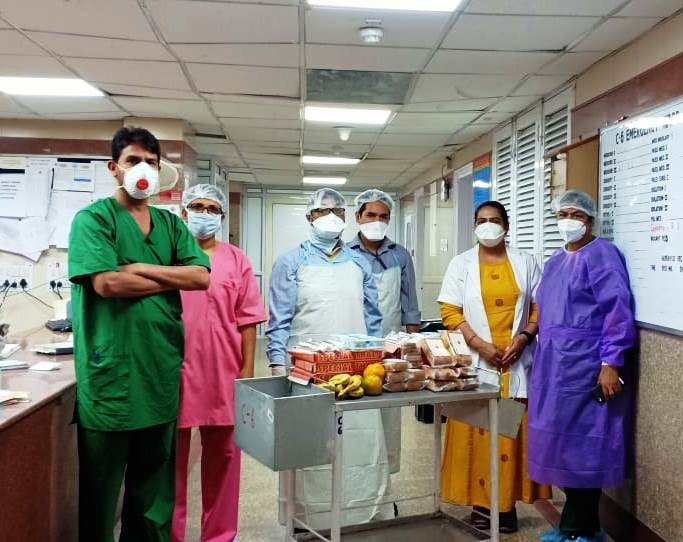
India ’s S&T Institutions Raise their Game Against COVID-19
- News
- 2.9K
COVID-19, also known as coronavirus, is making people all over the world go helter-skelter and clueless. As per the ‘worldometer’, over one million people have already fallen prey to this virus as of writing this and the numbers are increasing thick and fast. Over 59,000 people have succumbed to death and still counting. In India, it has affected over 3000 people and has witnessed about 60 deaths so far.
The World Health Organization (WHO) has pooled in resources and scientists from across the world in its search for a potential vaccine. India is also playing a big role in this at WHO. In addition, thousands of researchers around the world are offering their expertise, time and help through international platforms such as Crowdfight COVID-19 to fight against COVID-19. Researchers are also connecting through social media apps such as Twitter, Facebook, and LinkedIn to provide their services voluntarily.
With no vaccine in sight for at least the next 12-18 months, it seems the fight for rescuing humankind from this deadly virus has only just begun. With no real global consensus on the response mechanism, each nation is left to fend for itself when it comes to protecting its own citizens.
India’s quick response
With over 1.3 billion people in Her bosom, the spread of coronavirus in India and India’s response mechanisms are being closely watched over by the rest of the world. Led by the Hon’ble Prime Minister, Shri Narendra Modi, India is battling this virus with all its might. Invoking the Disaster Management Act of 2015, India announced a complete lockdown on 25 March for a period of 21 days. The early announcement of a lockdown, when the infected count was less than 400, was well appreciated by WHO. Setting up of a COVID-19 Task Force and the announcement of a series of ‘social distancing’ and other serious measures followed suit. A few such important measures are listed below.
- Started tracing contacts of COVID-affected people.
- Suspended all existing visas (except diplomatic, official, UN/international organizations, employment, project visas).
- Suspended all international and domestic flights, trains and bus services until April 15.
- Initiated economic measures targeting the poor so that none goes hungry during this period.
- Converted the coaches of Indian Railways as isolation wards.
R&D Institutions Taking Up the Challenge
While India’s pro-active, pre-emptive, and a ‘whole government’ approach to fighting the COVID-19 pandemic is happening on one side, the slowdown in trade between India and the rest of the world works as counter-productive on the other side. This slowdown in trade is disrupting the supply chains of many essential commodities needed for the fight. The list of such essential commodities includes COVID-19 testing kits, masks, alcohol-based sanitizers, personal protective equipment (PPEs), dress materials for frontline health workers, ventilators (breathing devices) for patients, etc.
The challenge is to produce these as quickly as possible and in bulk. This situation prompted the Government of India to vigorously activate the ‘Make in India’ Programme and involved various Research & Development (R&D) institutions of the country.
Under the leadership of Dr. Harsha Vardhan, Hon’ble Minister for Health, Science and Technology, and Earth Sciences, a well-coordinated approach has been adopted to activate the scientific community of the country. This approach has helped in providing a common platform for sharing of best practices, the collaboration of work, development of need-based innovations, and in avoiding duplication of research work. To cut it short, in such a short period of time, India was able to put thousands of researchers in the country to work round the clock to develop new testing kits, protective equipment, respiratory devices, etc.
India’s apex S&T agency and its efforts
Department of Science and Technology (DST) is India’s apex science and technology (S&T) agency. With the help of institutions under DST and sister ministries, DST is taking the lead in coordinating the effort to map and upscale appropriate technologies in India for addressing a plethora of issues related to COVID-19. It is also scouting for solutions that are more relevant to the country and also to help prepare the country for exigencies arising out of COVID-19 pandemic.
DST through its autonomous institutions and statutory bodies has instituted three ways to fight COVID-19:
- extensive mapping of solutions requiring R&D support, startups with viable products requiring facilitation and manufacturing support;
- identification of market deployable products requiring seed support; and support for solutions already in the market but requiring substantial scale-up to augment their manufacturing infrastructure and capabilities.
Intensification of Research in High Priority Area (IRPHA)
Science and Engineering Research Board (SERB) is an autonomous body under DST. Under its Intensification of Research in High Priority Area (IRPHA) scheme, SERB had invited competitive proposals having a strong interdisciplinary component to ramp up national R&D efforts for epidemiological studies, studies on immune response and immunity during respiratory viral infections, new anti-viral, vaccines, and affordable diagnostic against COVID-19 and related respiratory viral infections. Apart from this, SERB also invited short-term ‘Core Research Grant Special Call on COVID-19’ to meet the current requirements of the health workers such as (a) affordable and portable rapid diagnostic kits or tools, (b) computational identification and validation of COVID-19 molecular targets, and (c) drug repurposing against key COVID-19 targets and in-vitro/clinical dose testing of nutritional supplements for immunity.
The first set of five projects has been selected by SERB, which will be supported for further development into implementable technologies. Three of these projects concern the highly important issue of antiviral and virustatic surface coating of inanimate surfaces, such as personal protection equipment (PPE); the fourth one deals with the identification of metabolite biomarkers in COVID-19 infected patients enabling therapeutic target identification, and the last one concerns with the development of antibodies against the receptor-binding domain of the spike glycoprotein of coronavirus.
Tracking and trailing the virus through a data-driven approach is an important step to contain its spread. In this direction, SERB has announced a short-term project on mathematical modeling of COVID-19 spread; statistical machine learning, forecasting, and inferences from pandemic data; focused algorithms for infectious disease modeling and quantitative social science approaches for epidemiological models. In the absence of preventive and curable measures, mathematical models may help in assessing the potential for sustained transmission to occur in new areas.
Research Proposals Invited By TDB
The Technology Development Board (TDB), a statutory body under DST, has invited proposals from Indian companies and enterprises to address protection and home-based respiratory interventions for COVID 19 patients. Industries may help in this crucial condition to provide need-based indigenously developed/imported technologically and innovative solutions like low-cost masks, cost-effective thermal scanning devices, technologies for sanitization of large areas as well as for contactless entry, rapid diagnostic kits and oxygenators, and ventilators.
Artificial manual breathing unit (AMBU)
Sri Chitra Tirunal Institute of Medical Science and Technology (SCTIMST), Trivandrum, has developed a ventilator system based on an artificial manual breathing unit (AMBU). The institute’s automated AMBU ventilator with inputs from clinical faculty will assist in the breathing of the critical patients who have no access to ICU ventilators. The technology has rapidly moved into clinical trials and manufacturing through Wipro3D, Bangalore. Apart from this emergency ventilator, the Institute is also making efforts in developing low-cost AI-enabled digital X-ray detectors for screening COVID-19 patients.
Anti-microbial coating
The Jawaharlal Nehru Centre for Advanced Scientific Research (JNCASR), an autonomous institution under DST, has come up with a one-step curable anti-microbial coating. This coating is capable of completely killing the influenza virus and resistant pathogenic bacteria and fungi, including methicillin-resistant Staphylococcus aureus, fluconazole-resistant C. Albicans spp. and a range of virus types Severe Acute Respiratory Syndrome Coronavirus 2 (SARS-COV-19). It is anticipated that the coating will not allow microorganisms to become active on coated surfaces. During the COVID-19 outbreak, the coating may be used to protect personal protective tools, clothes, and equipment of health workers.
Grassroots Innovations
The National Innovation Foundation (NSF), another autonomous institution of DST encourages and supports grassroots innovations developed by individuals and local communities in any technological field. NSF has invited citizens to come up with creative and innovative ideas through its ‘Challenge COVID-19 Competition (C3)’ for tackling the following issues: (a) healthy food for nutrition and boosting immunity; (b) reducing transmission of coronavirus; (c) sanitizing one’s hands, body, home items, and home, public places wherever required; (d) supply and distribution of essential items to people, especially the elderly living alone; (e) gainful engagement of people at home; (f) PPEs and rapid diagnostic testing facilities for capacity building of healthcare; and (g) rethinking “contactless” devices for post-corona implementation needs and varying needs of the different segment of the population during COVID-19. Besides inculcating scientific temperament among masses, this initiative will also encourage them to participate actively in the government’s programs against the pandemic.
Synergizing S&T efforts
As mentioned earlier, the Government of India has set up a ‘COVID-19 Task Force’ for mapping the COVID-19 related technology capabilities in start-ups, academia, research and development labs, and industry. The capacity mapping group consists of representatives from DST, Department of Biotechnology (DBT), Indian Council for Medical Research (ICMR), Ministry of Electronics and Information Technology (MEIT), Council for Scientific and Industrial Research (CSIR), Atal Innovation Mission (AIM), Ministry of Micro, Small and Medium Enterprises (MSME), Start-up India and All India Council for Technical Education (AICTE).
This Task Force has identified over 500 entities in the areas of diagnostics, drugs, ventilators, protection gear, disinfecting systems, etc. The solutions identified include masks and other protective gear, sanitizers, affordable kits for screening, ventilators and oxygenators, data analytics for tracking, monitoring, and controlling the spread of outbreak through AI and IoT-based solutions, to name a few.
The Department of Biotechnology (DBT) and the Biotechnology Industry Research Assistance Council (BIRAC), a sister department of DST, have also announced COVID-19 Research Consortium Program and are seeking proposals from industry, academia, industry-academia partnership with a focus on affordable diagnostics, vaccines, novel therapeutics, repurposing of drugs or any other intervention for control of COVID-19.
The Council of Scientific and Industrial Research (CSIR), under its New Millennium Indian Technology Leadership Initiative (NMITLI), is also seeking proposals from industries for effective containment interventions, assistive devices such as affordable ventilators, innovative diagnostics (rapid, affordable, cutting edge), novel drugs or repurposed drugs, new vaccines or repurposed vaccine, and track-and-trace technologies.
Other innovative, rapid and economic solutions are also coming from other institutions. For instance, CSIR-Institute of Genomics and Integrative Biology (IGIB) has developed a paper strip-based testing assay. This testing assay can detect the viral RNA of the novel coronavirus SARS-Cov-2 within an hour.
Many research groups are focussing on basic science and other social aspects of this pandemic like virus morphogenesis & development, sequencing of local strain, virus-host interaction, genetic variants linked with virulence, evolution and transmission pattern, pathogenesis studies and collection of epidemiological data. These studies are very much necessary for the development of vaccines and therapeutic drugs against COVID-19.
S&T at private labs
Efforts and contributions from private players have indeed accelerated the process of the development of diagnostics, vaccines and novel therapeutics. A Pune-based molecular diagnostics company, Mylab Discovery Solutions, has developed the first COVID-19 rapid testing kit in India. This testing kit has been approved by the Indian Food and Drug Administration, the Central Drugs Standard Control Organisation (CDSCO), and the ICMR. This kit can give test results within 2.5 hours. After joining hands with Serum Institute of India and AP Globale, the test capacity of Mylab has increased from 1.5 lakh tests a week to 20 lakh (2 million) tests a week.
An incubate company of the Pune-based Science and Technology Park (STP or SciTech Park) has come up with an innovative anti-COVID-19 solution through a product called ‘SciTech Airon’ under the ‘Nidhi Prayas’ program of DST. The start-up claimed that the ionizer machine generates negatively charged ions at approximately a hundred million per 8 seconds (10 ions per sec). This machine has the potential to reduce the viral load within a room by 99.7 percent (based on room size). This can be of good help to sanitize the quarantine facilities and hospitals.
Along with technological and medical solutions, preparation of science-based IEC (information, education, and communication) material and disseminating the same to the larger public also form an important task. Such IEC material can dispel the myth, panic, and psychological stress being faced by the public. One such government-led AI-based app called ‘Corona Kavach’ was developed in that direction. Other similar tracking apps are also available to alert users when they come in the proximity of a confirmed coronavirus positive person. However, these apps have not gained enough traction among the public so far.
Comprehensive efforts at war foot
The Government of India is fully committed to facilitating the Indian health and scientific community in the fight against COVID-19. The government scientific agencies are not leaving any stones unturned in order to provide full support to the community, researchers, private and public research labs, start-ups, incubators, entrepreneurs and industries. Funding agencies are trying to link national projects with global projects to share the expertise among nations, avoid duplication and speed up the entire process when and where required.
On 21 March, Indian scientists were given access to collect blood, nasal and throat samples from COVID-19-infected people through a memorandum issued by the government’s Empowered Committee on COVID-19. This announcement has spurred several research projects related to the sequencing of local COVID-19 strain, the development of diagnostic kits, vaccine and so on. Furthermore, the government allows all national research laboratories including those under CSIR, DBT, DST, and Department of Atomic Energy (DAE) to carry out COVID-19 testing. This will help to speed up the screening process and fasten tracing of contacts.
On 3 April, DST has set up a ‘Centre for Augmenting WAR with COVID-19 Health Crisis’ (CAWACH) at a total cost of Rs 56 Cr to evaluate and support up to 50 innovations and start-ups that address COVID-19 challenges. CAWACH is set up in the Society for Innovation and Entrepreneurship (SINE), a technology business incubator at IIT Bombay. Supported by DST, CAWACH will provide timely support at different stages for fast-tracking the commercialization process and scale-up of technologies across the country. The Government of India firmly believes that these R&D initiatives will certainly help the country in overcoming the pandemic in the not-too-distant future.
(Jyoti Sharma is a Senior Scientist and S.K. Varshney is Head, International Bilateral Cooperation Division, Department of Science and Technology.)
Jyoti Sharma / S.K. Varshney
If you liked this article, then please subscribe to our YouTube Channel for the latest Science & Tech news. You can also find us on Twitter & Facebook.


